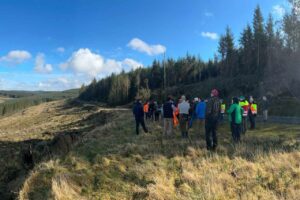Maintaining Standards with Glastir

Sonia Winder MICFor, Forest Manager at Tilhill Forestry, has been one of the first Chartered Members of the Institute to be registered as a Glastir Woodland Management Planner, under the scheme’s new terms and conditions. Since July, in order to register with Glastir, Planners must be members of ICF or a similar professional body. Here Sonia discusses the benefit of this clause for maintaining woodland management standards in Wales.
Forestry grants in Wales are no longer administered by the body which used to be the Forestry Commission. Under the current RDP they have been brought under the remit of Welsh Government, and are administered by their Rural Payments Wales department as part of the agricultural funding stream.
Applicants to any Glastir woodland scheme must use a Registered “Glastir Woodland Management Planner” to prepare and submit their Plan. The management plan is the prerequisite to funding under Glastir woodlands schemes. The registered Glastir Woodland Management Planner therefore plays a critical role in the delivery of value-for-money Glastir woodlands schemes, in partnership with the landowner, agent and Welsh Government. The Welsh Government want to ensure the highest professional standards, and that performance which falls short can be dealt with.
The selection process to become a Glastir management planner is by application. For the first time, Welsh Government have stated that applications may only be made by individuals who are Members of the Institute of Chartered Foresters (ICF) or a similar professional body.
Whilst it stops short of asking for full membership (MICFor or FICFor) at the time of application, Associate members have only 3 years to become full members or be withdrawn from the list of approved planners.
This is a shift in focus and a boost for the ICF, which has long been calling for proper recognition of the Chartered status of forestry professionals.
Recognising Professional and Ethical Standards
Welsh Government cites the ICF’s 6 professional and ethical standards as being essential for every Management Planner. The recent redistribution to members of these (ICF’s Code of Conduct) is timely. It requires that members:
- Act with integrity
- Always provide a high standard of service
- Treat others with respect
- Take responsibility
- Act in a way that promotes trust in the profession
- Have regard for sustainability throughout their work
These are not aspirations, they are basic standards which we should apply in our whole professional lives, and probably outside too! We all fall short sometimes of what is expected of us, and somebody once said that the only way never to make mistakes is never to make anything at all. But taking responsibility and putting things right is part of being a good professional.
Glastir woodland management plans are also required to adhere to the practice of sound silviculture as detailed in
There is a big advantage for Welsh Government in stipulating stringent professional forestry standards from us.
Changing Times for Welsh Forestry
In the ‘good old days’ Woodland Officers were usually knowledgeable foresters with years of experience, who could discuss management decisions with us on a level playing field. Welsh Government’s rural inspectors now may have to deal with anything from silage quality to farm buildings. Few have woodland expertise. It is up to us as Chartered Foresters to demonstrate that the management of the private woodland estate in Wales is exemplary, sustainable, and that the legacy of a quality timber stock bequeathed us by those visionary foresters of yesteryear, isn’t being squandered now. Forestry is a long term practice which doesn’t sit well within the constraints of 5 year EC funding cycles. Let’s ensure we step up to the plate as professional representatives of an industry that we can continue to be proud of.
Sonia Winder has worked at Tilhill Forestry for 19 years, currently in the role of Forest Manager. Visit www.tilhill.com for further information about their work.





